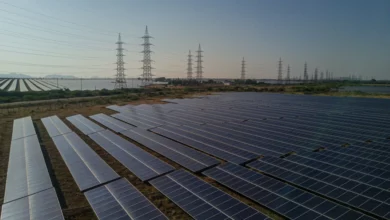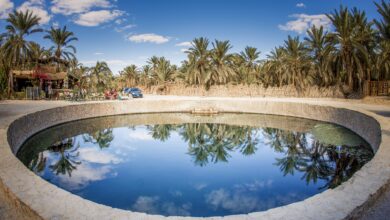As the country continues to suffer from daily power cuts, environmentalists are looking for alternative energy-saving options, including going “off the grid.”
While power cuts are nothing new in Egypt, this summer has had particularly lengthy electricity outages that the government attributes to increased electricity demand because of the heat.
A massive blackout earlier this month stopped two of three subway lines and delayed the opening of trading on the stock exchange. Power cuts continue on a near daily basis and last for hours.
The problem, environmentalists say, is twofold. There is too little power available but also a staggering culture of consumption.
“Supply isn’t catching up with the demand. Because energy is so cheap, we don’t have the consciousness of looking after how much energy is used on a daily basis and the result is it isn’t used very efficiently,” says Karim Tarraf, a project manager at Frankfurt School-UNEP Colllaborating Centre for Climate and Sustainable Energy Finance.
Egypt Independent previously reported that household electricity accounts for the bulk of Egypt’s electricity usage — 42 percent — while industry uses 32 percent and public facilities use 26 percent.
The government has already announced measures to bolster supply. The Energy and Electricity Ministry announced Thursday that a 500-megawatt, natural gas-fed power plant in Damietta is now operating at full capacity. President Mohamed Morsy has promised at least a second station in Alexandria.
“Egypt needs more power stations, but it takes time to build such stations and for too long the investments in updating existing stations haven’t been made,” says Tarraf. “From a supply side, there’s no quick solution. That’s why the government came with suggestions from the demand side.”
Tarraf says small changes, such as setting air conditioners a few degrees higher or turning off lights in unused rooms, can help reduce the load on the grid.
“Everyone leaves their lights on in Egypt. But it’s not just control of private households, but also public buildings, like universities and hospitals, which operate lights 24 hours a day, even if no one is there,” he says.
Already officials are looking for short-term solutions to reduce the strain on the country’s electricity grids. Last week, the government said it was considering a law calling for shops to close at 9 pm and restaurants at 11 pm, to help reduce overall energy consumption.
For Tarraf, the idea makes sense. “An initiative to close shops and malls is a fair short-term solution,” he says. “People are disappointed because one of the benefits of living in Egypt is that you can buy things 24 hours, but you can’t underestimate the degree of energy usage places like City Stars and shops with air conditioning take up.”
Egypt is one of the few countries in the world with a well-established labeling system for household appliances. When buying a refrigerator, freezer, washing machine, air conditioner or electric water heater, consumers can check the energy labels.
“In Carrefour, you’ll find labels on products, and can buy products that save up to 20 percent in home energy usage. Energy efficient refrigerators can cut 10 percent of total household use,” says Tarraf. “When people are out shopping for appliances, they are either not aware that these exist or they aren’t prioritizing their use.”
He says education and more awareness campaigns are needed if the country is to ever change its consumption patterns. An energy-efficient focus could create an industry in recycling old appliances and with that, new jobs.
“By going into the small scale, there’s a real big-picture incentive here,” Tarraf says.
The owner of the energy-efficient products provider Oasis-EMICO Egypt, Amr Farouk, wrote on an environmentalist mailing list that the country needs to rethink its approach to construction and place more importance on building materials and building orientation, as well as in-house energy consumption. He advocates that homes switch to energy-efficient products such as energy-saving compact florescent lamps.
During a recent webinar held by the Energy Collective (a group of energy industry professionals), Christine Hertzog, managing director of the advisory firm Smart Grid Library, voiced similar concerns.
“There’s got to be a lot of private and public investment. With a great amount of innovation, commercial real estate has tremendous potential,” she says.
Solar panels or wind turbines attached to buildings means that even if a disaster takes out a plant, commercial enterprises will be able to continue to work. It may cost more, but many businesses are willing to pay a premium to ensure the productivity of workers onsite.
For now, though, environmentalists say the priority should be on developing small-scale initiatives with renewable technologies.
Egypt already has two large-scale solar power projects under way. Al-Koraymat, south of Cairo, is set to produce 20 megawatts of solar power, alongside 120 megawatts of conventional natural gas power. The plan is to build a 100-megawatt plant, Kom Ombo, near the Aswan Dam hydroelectric plant. But issues such as land rights and the ability to replicate pilot projects act as major barriers to developing large-scale renewable energies.
“Egypt isn’t in a position to attract the large-scale investments needed for big wind power and solar projects. There are pilot projects which have been built up, but not really replicated at any other sites,” Tarraf says.
Instead, he says the government should encourage already existing small-scale technology that is funded by the private sector and banks.
These ideas have gained popularity in other countries where the cost of electricity is high and there is strong financial incentive to provide one’s own power. In Egypt, energy prices are subsidized by the government.
Farouk says there’s likely to be a growing interest in household and private energy generators managed by green energy activists who can afford this device or by people who presently have no access to the grid and rely on diesel generators.
As the energy problem grows in Egypt, more people are turning to green technologies in their homes. Farouk’s company, Oasis-EMICO, offers standalone solar-powered water heaters, along with other for-home solar and wind power technologies.
Household generation is a common practice in Israel, where most homes rely on rooftop solar panels to heat water. A similar practice is increasingly popular in Germany and Italy.
In Egypt, the government was considering a law in 2010 that would attempt to regulate seed subsidies for green energy, as well as feed-in tariffs for electricity.
While Farouk says it seemed unlikely the government would want to subsidize the more costly green energy electricity to help supply the grid, he says that in 2011, officials allocated LE300 million in funds for renewable energy for out-of-grid applications.
Many of his sentiments were echoed by US energy experts in a recent webinar held by the Energy Collective.
“We need to be thinking about how governments can create different policies to encourage these innovations and improve grid reliability and resilience,” says Larisa Dobriansky, senior vice president of regulatory, legal and energy policy for the US-based energy firm General Microgrids.
“We need to provide market mechanisms where private investment can flow so people see the value of investing here and [that] it isn’t always a directive of policy."
This piece was originally published in Egypt Independent's weekly print edition.




